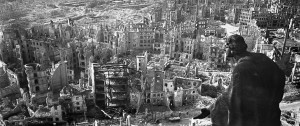Slaughterhouse 5 centres around the fire bombing of Dresden by Allied forces on the 13th, 14th and 15th of February 1945. Considered one of the best anti-war novelists, Vonnegut shows the atrocities of the second world war as not being limited to those at Hiroshima. The Dresden Blitzkrieg killed many more civilians than Hiroshima and and unlike Hiroshima the international community remained silent. Although both were terrible massacres, Dresden seemed to have been lost to history.
The main character, Billy Pilgrim is an optometrist who finds himself the subject of time’s whimsical desire. He travels through time to points in his own life, often prompted by memories of the war. His travels include an all expenses paid holiday to a zoo on another planet called Tralfamadore. There he is put on display to the great excitement of the natives where he is also encouraged to have sex with a famous starlet; Montana Wildhack.
As well as an interstellar traveller, Billy is a prisoner of war in Germany. He is physically and psychologically averse to the life of soldiery, too tame for the horrors of war. Even as a prisoner he is presented as farcical example of a pistoleer. Vonnegut paints him as wearing; “silver boots now, and a muff, and a piece of azure curtain which he wore as a curtain.” Based on another soldier Vonnegut encountered, Pilgrim doesn’t belong and his extraterrestrial adventures are an escape from his fears of the past.
To label Slaughterhouse 5 as an anti-war book is wrong as it is to label it a sci-fi novel. Moulding the two genres allowed Vonnegut to produce a piece of literature much bigger than itself. By using Tralfamadore Vonnegut becomes distanced from the massacre which he witnessed. The creatures of Tralfamadore see life in the 4th dimension; time; “The most important thing I learned on Tralfamadore was that when a person dies he only appears to die. He is still very much alive in the past, so it is very silly for people to cry at his funeral.”
By using science fiction Vonnegut enables himself and his character to create an ironic register in something which brings most to tears. This is Vonnegut’s power. By sustaining a bleak humour in such a fearsome topic, he can condemn the war gratuitously through irony.
